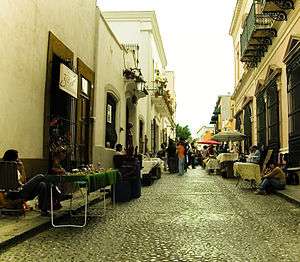Barrio Antiguo
Popularly known as the Barrio Antiguo (Spanish old quarter) comprise what is preserved from the historical quarter of the city of Monterrey, Nuevo León, Mexico. Currently located next to the Government Palace and the Macroplaza, it originally covered a larger space from the Santa Catarina River to 5 de Mayo Street, south to north, and from Mina Street to Roble Street (nowadays Avenida Benito Juárez), east to west. Most of the buildings now preserved are from the Spanish Colonial period and from the last years of the 19th century.

Archaeologically speaking, the oldest Monterrey dates from the very founding of the city at the end of the sixteenth century. However, the buildings preserved today date mostly from the eighteenth century onwards. It used to be the commercial and cultural center of the city during the existence of the Viceroyalty of New Spain until recently the first half of the 20th century, when other parts of the city began to grow more to the detriment of the center. During the last decades of the 20th century there was a modern lifestyle in the Barrio Antiguo, characterized by the construction of hotels, museums, bars, discos and restaurants of international cuisine. Thus until depopulation and partial abandonment tended to decline from the 1990s to recent times, as currently there are projects under way for its restoration. Many houses of what used to be the Barrio Antiguo were demolished to give way to the construction of the Macroplaza (lit. big square) at the end of the past century. During the last decade of the twentieth century and recent years, Barrio Antiguo was well known as the center of the nightlife of Monterrey due to measures taken by the State in a failed attempt to create reforms that pushed the re-activation of the urban center.
Since 2006, due to the insecurity that was rampant in the city of Monterrey, nightlife in the Barrio Antiguo almost ended, but since recent times due to the relative decline in violence many of the bars have managed to survive. From the year 2013 the government changed the way in which the Old Quarter was considered. A restoration project was started since then, which seeks to build a space for cultural recreation and preservation of the historic heritage, through the closure of some of its streets now pedestrianized (so far is the case of Calle Morelos) and re-activation Social or family business.
Venues
- Antrópolis
- Café Iguana
- Ibex Rock Bar
- La Galería Café
- Manaus
- McMullen's Irish Pub
- Monasterio
- Neuken
- Casa Morelos
- Novum
- Nueva Luna
- Riviera
- Trece Bar
- The Bean Lounge
- Clandestino
- Art Club
- La Tumba
And many more clubs and bars.